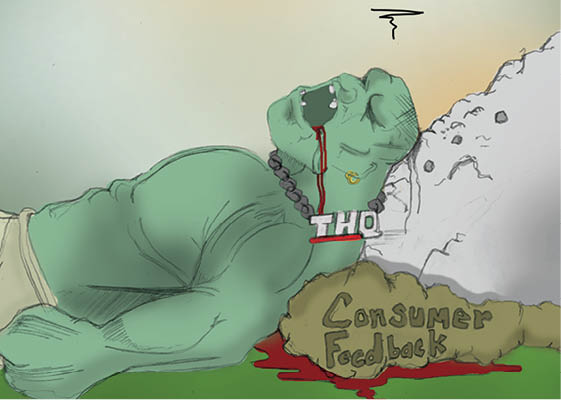
Gaming developer and publisher THQ declared bankruptcy and, as of Jan. 22, is defunct.
For years, THQ brought us games like Saints Row, Red Faction, MX vs. ATV, Company of Heroes and Dawn of War. However consecutive losses in profit, the lack of success in selling its uDraw tablet and recently produced games, and the inability to repay a loan to Wells Fargo caused THQ to collapse. Most of THQ’s assets are being sold off and buyers are lining up for the biddings.
I’m not here to mourn the loss of this giant, nor am I writing this to condemn their mistakes; instead I would like to use the death of THQ to draw attention to some serious issues facing the gaming industry today.
The past few years, we’ve seen dramatic changes occur which have brought some positive, but mostly negative effects; in turn, most of the major publishers have made terrible decisions and shown a severe ineptitude to adapt to events, such as the 2008 recession and the rise of online piracy.
The collective list of publishers’ missteps in the last six years is long and, in places, atrocious: the inclusion of online passes that force gamers to buy only new copies, locking content on disks that makes us pay extra for pre-purchased content, the oversaturation of mediocre games in the first-person-shooter market, the creation of DRM (Digital Rights Management) which inadvertently promotes piracy by requiring certain games to always be played online, the investment in broken motion-control gaming like the Kinect, shutting down entire gaming forums and banning gamers’ accounts for raising genuine complaints, and tarnishing old series’ by releasing poor reboots.

It is understandable when a company is struggling and needs to make sacrifices to prevent losses and layoffs, but there is no excuse for keeping your consumer base in the dark. That’s just bad business and any company will tell you so.
Publisher Electronic Arts (EA) has been experiencing losses recently. In the past, the company has banned users from both personal accounts and forums for raising complaints. To add to their list of offenses, they have locked gamers out of content already on the disk, and ruined the franchises of Syndicate and Medal of Honor by producing poor installments.
EA, Ubisoft, Capcom, and Activision won’t be far behind THQ if they don’t change their ways soon. The push by these big publishers for digital only distribution will make things worse by destroying companies that depend on the trading and selling of old and used games — alienating people who don’t have internet connection, and likely increasing piracy.
Despite the economic environment, the recent actions of publishers is not justified for two reasons. One: you never openly disrespect your consumers, and two: there are gaming developers and publishers who are thriving right now. Valve, Bungie, Bethesda, Creative Assembly and Rockstar, just to name a few. These companies made changes to navigate hard economic times, but they didn’t do it at consumers’ expense.
Valve always makes sure to listen to complaints raised by their consumers. They take their time when developing, release DLC at reasonable prices, and consistently offer discounts and sales from their online gaming store, Steam.
The bottom line is we’re living in uncertain economic times and the gaming industry needs to get with the times like the rest of the entertainment industry. THQ didn’t realize this ‘till it was too late, but that doesn’t mean the rest of the publishers are destined the same fate.







